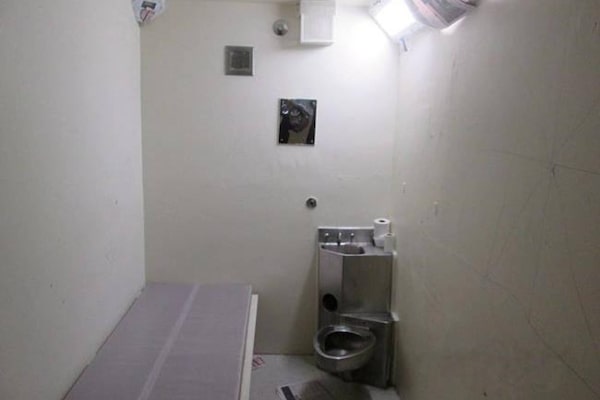
A solitary confinement cell is shown in a photo from the Office of the Correctional Investigator.
Two civil liberties groups are asking the federal government to give up its defence of solitary confinement in the courts, and instead sit down for talks aimed at putting stringent limits on the practice.
In the past five weeks, judges in British Columbia and Ontario have found solitary confinement to be unconstitutional in its current form, and given the government a year to make major changes. The Liberals proposed a new law on solitary confinement last June, but it appears to fall short of the minimum standards for the system set out by a B.C. judge.
The two court rulings present an opportunity for the Liberals to live up to their stated commitment to abolish the practice in its most prolonged form, according to the B.C. Civil Liberties Association and the Canadian Civil Liberties Association, which brought the court challenges separately three years ago, weeks after The Globe and Mail began examining solitary-confinement practices in the country, starting with an investigation into the 2010 death of Eddie Snowshoe after 162 days in solitary.
"Not one but two provincial superior courts have spoken, affording the federal government an opportunity to change course. We request the opportunity to discuss next steps with the Attorney General and Minister of Justice, and the Minister of Public Safety and Emergency Preparedness, with a view to avoiding unnecessary litigation and proceeding with a Parliamentary solution," the groups said in a letter sent on Jan. 23, and obtained by The Globe.
Public Safety Minister Ralph Goodale, the lead minister on the issue, declined The Globe's request for an interview. Scott Bardsley, a spokesman for the minister, said his office is reviewing the letter and last week's B.C. court ruling. The government has 30 days from the Jan. 17 ruling to file an appeal.
"The government is committed to addressing the needs of the most vulnerable in the federal correctional system," Mr. Bardsley said. "Our goal is to ensure consistency with the Canadian Charter of Rights and Freedoms and best correctional practices."
The proposed law, Bill C-56, imposes "a presumptive time limit on the use of administrative segregation and implements a system of independent oversight," Mr. Bardsley said in an e-mail.
The government defended its practices during both the Ontario and B.C. court cases, saying they are a necessary and reasonable tool to protect the security of inmates and guards.
In the government's bill, the proposed time limit would be 21 consecutive days, reduced to 15 days after 18 months. But a senior prison official could extend the time in individual cases. And while there would be a chance for a review from someone other than the prison warden, that review would be done by an official with Correctional Service Canada.
Mr. Bardsley quotes Ivan Zinger, the federal prison ombudsman, as saying that the bill, which needs Parliament's approval to become law, "will put Canada at the forefront of best correctional practices in the world." Even so, the Liberal government, which has often called itself pro-Charter, finds itself in a legal and political bind.
The B.C. ruling set out tough constitutional standards for a system of solitary confinement, defined as up to 22 hours a day in a tiny cell. (Ottawa has denied it uses solitary, but B.C. Supreme Court Justice Peter Leask said its system of "administrative segregation" amounts to the same thing.)
Justice Leask wrote that external oversight – outside of the correctional service – is necessary when a review is done. Inmates need legal representation at segregation hearings, he said.
The Ontario ruling, by Superior Court Associate Chief Justice Frank Marrocco, did not go as far. He found that oversight independent of the prison wardens but still within the correctional service would pass muster. The Canadian Civil Liberties Association appealed in mid-January, and Ottawa has 15 days from that point to file its own appeal.
"I think there's an obligation on the Attorney-General of Canada to withdraw the bill because it's unconstitutional, clearly," Michael Bryant, the executive director and general counsel of the CCLA, and a former Ontario attorney-general himself, told The Globe.
Josh Paterson, the BCCLA's executive director, said the court challenges could take another five years if the government continues the fight. "The changes need to happen now," he said in an interview. "More suffering, more death would be certain to result in the meantime if we're not able to move quickly."
What the civil-liberties groups demand and what the government put in its proposed bill are far apart. "Independent oversight has got to be brought to bear," Mr. Bryant said. "These administrative decisions just can't be left to people who are obsessed with security."
Under the Liberals, the use of administrative segregation has dropped from 800 three years ago to about 250. But Mr. Paterson said that the numbers have fluctuated in the past and could rise again without new guarantees written into federal law.
While it is possible that the government could file appeals and continue to talk with the civil liberties groups, Mr. Bryant said that in his experience, the resulting conversation would become much more difficult.
 Sean Fine
Sean Fine